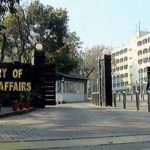ISLAMABAD, Oct 4 (APP): Advisor to the Prime Minister on Foreign Affairs Sartaj Aziz on Tuesday said Pakistan’s ground realities were rapidly changing for the better, with decisive and comprehensive action to combat violence, terrorism and extremism.
He was speaking at the briefing seminar ‘Strategic Vision of Pakistan’s Foreign Policy’ organized by the European Institute of Asian Studies in collaboration with the Embassy of Pakistan in Brussels.
“The heroic efforts and sacrifices of our armed forces in Zarb-e-Azb supplemented by intelligence based operations around all major urban centers, Madrassah reforms and
conviction of terrorists through military courts, have released Pakistan from the shackles of terrorists and extremists,” he added.
He said Pakistan’s own security being first pillar of its foreign policy implied non-interference in other countries’ internal affairs and refrain from fighting other’s wars or supporting causes of conflict that did not concern the country directly.
Sartaj Aziz is visiting Brussels in connection with the international conference on Afghanistan and Pakistan’s 3rd strategic dialogue with the European Union.
He stated that phenomenal rise of China and its close relations with Pakistan, combined with Pakistan’s improved ties with Russia opened the prospects for converting
Pakistan’s geo-strategic location from a liability into an asset for economic development of the country and entire region.
But unfortunately this positive trend has been counter-balanced by India’s continuing policy to pressure Pakistan, by sponsoring terrorist campaigns inside Pakistan to foment
separatism or by ceasefire violations on the LoC in Jammu and Kashmir to constrain Pakistan Army’s ability to deploy more resources on the western borders with Afghanistan.
Sartaj Aziz pointed out that India also maintained direct military pressure on Pakistan through deployment of advance weapons systems, offensive troops positioning and exercises along the border to refine the capacity of a surprise attack, as envisaged in its Cold Start Doctrine.
“Regrettably, India also openly opposes China Pakistan Economic Corridor (CPEC) for no apparent reason than to obstruct the economic development of Pakistan. India’s
proclivity to use of force against innocent civilians in Indian Occupied Kashmir (IoK) and its refusal to discuss the long-standing Jammu and Kashmir with Pakistan locks the relationship of our two countries in a perpetual crisis,” he added.
He stated that peace and stability in Afghanistan remained critical for security of Pakistan. Formation of a national unity government in Afghanistan in September 2014 had brought about a significant improvement in Pakistan’s relations with Afghanistan. However, intensification of hostilities in different parts of Afghanistan, following the withdrawal of ISAF forces and the stalled Peace Process strained relationship between the two countries, he stated.
Sartaj Aziz further said that internal political divisions within National Unity Government and failure to articulate clear modalities of reconciliation complicated the peace process. Despite these constrains, the Quadrilateral process, comprising Afghanistan, Pakistan, the US and China
will continue, he added.
About Pakistan’s relations with EU Sartaj Aziz said, “We view our relations with the European Union as an important component of our foreign policy. The European Union is a traditional ally and a major trading and investment partner.”
He further added, “We are ready to further expand and deepen our partnership with the European Union. At the Third Pakistan-EU Strategic Dialogue meeting today, the modalities of a new framework of cooperation, which would be launched in 2017, the new framework would help to establish a long-term strategic partnership between Pakistan and the European Union.”






